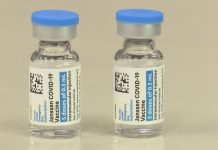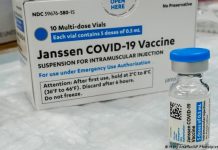A new drug trial for Alzheimer’s patients has just been completed, and researchers are calling the results the most promising yet in the fight against the disease.
Treating Alzheimer’s likely won’t ever be an easy or simple thing. Researchers think that managing the disease will require a combination of treatments, possibly tailored to each person. But in a paper published Wednesday in the journal Nature, scientists from a biotech company report the most encouraging results so far for one drug that could play a key role.
Researchers at Biogen say that the antibody they have been testing can bind to and break down the amyloid protein that builds up in abnormal amounts in the brains of Alzheimer’s patients. Even more encouraging, they report that for a small number of people in the study, that reduction in amyloid plaques was linked to a slowing in the cognitive decline associated with Alzheimer’s.
“We are pretty certain of the fact that the antibody reduces the amyloid plaques and in some ways gets rid of the majority of it,” says Alfred Sandrock, senior author of the paper from Massachusetts-based Biogen. “That’s important because if we really want to treat Alzheimer’s at even the very earliest stages, then we felt it was important for our antibody to remove the plaque that’s already there.”
The results of the trial, which Biogen has revealed in pieces at previous scientific conferences, shows that the higher the dose of the antibody, called aducanumab, the more amyloid is removed. In the trial of 165 people with mild to moderate Alzheimer’s, participants were randomly assigned to receive either placebo or one of three different doses of the drug. After a year of monthly infusions, those receiving the highest doses showed the most reduction in amyloid compared to the start of the study.
The small number of people who were tested on cognitive function showed promising signs that reducing the amount of amyloid in the brain might translate into improved function, but that’s just an early hint. The company is recruiting people for two other ongoing trials that aim to answer that question. So far, though, the drug seems to slow the cognitive decline; whether this decline can return brains to their pre-amyloid, pre-Alzheimer’s function won’t be known until the additional studies are completed.
What happens when amyloid builds up in the brain is a complex process that involves damage, some of it permanent, to nerves and neural networks. But animal work showed that some nerves surrounding amyloid plaques were restored to close to their original function, providing hope that it might be possible to recover at least some cognitive function if amyloid plaques are removed.
It’s not clear yet exactly how the antibody is melting away the plaque, but studies in animals may provide a clue. In earlier trials, researchers think the aducanumab is breaking down the amyloid and attracting the body’s immune system to dispatch the remnants — specifically a class of cells known as microglia, which can digest biological residue.
Aducanumab is one of several anti-amyloid strategies that companies are pursuing to treat Alzheimer’s. Biogen believes its compound has an advantage in that it doesn’t bind to amyloid that most people have circulating in the blood; instead it preferentially targets the amyloid that is aggregated in plaques in the brain, which Alzheimer’s experts believe is the most toxic form of the protein and responsible for the disease’s symptoms of memory problems and cognitive decline.
The drug is not without side effects. The people getting the highest dose showed higher rates of a brain swelling that’s been linked with aducanumab and other drugs in earlier trials. About 41% of those receiving the drug at any dose showed this side effect. Stephen Salloway, professor of neurology and psychiatry at Brown University and one of the co-authors of the paper, says that swelling could be monitored with more frequent brain scans. The researches also learned that people with a genetic predisposition to developing Alzheimer’s are also at higher risk of developing the side effect.
Salloway says that more studies will be needed to understand what is causing the swelling, but it’s possible that the dramatic change in amyloid could be the major factor. Most of the swelling occurs soon after people start taking the drug, and it subsides if they stop the treatment.
“At this point, I would not be so concerned that I would advise people not to participate in the trials of the drug,” says James Hendrix, director of global science initiatives at the Alzheimer’s Association. “It’s something the company is keenly aware of, that the Food and Drug Administration is keenly aware of, and the we just need to see if we can manage the risk. I’m very excited by these results.”
If the additional studies confirm these early results, it’s possible that aducanumab could be used as a preventive therapy doctors prescribe to people who might be at higher risk of developing Alzheimer’s. Routine screening for amyloid could also become more common if treatments like these become available, so that doctors can find those who might benefit most from these medications and stop the disease before it really takes hold.
Laura F. Nixon













